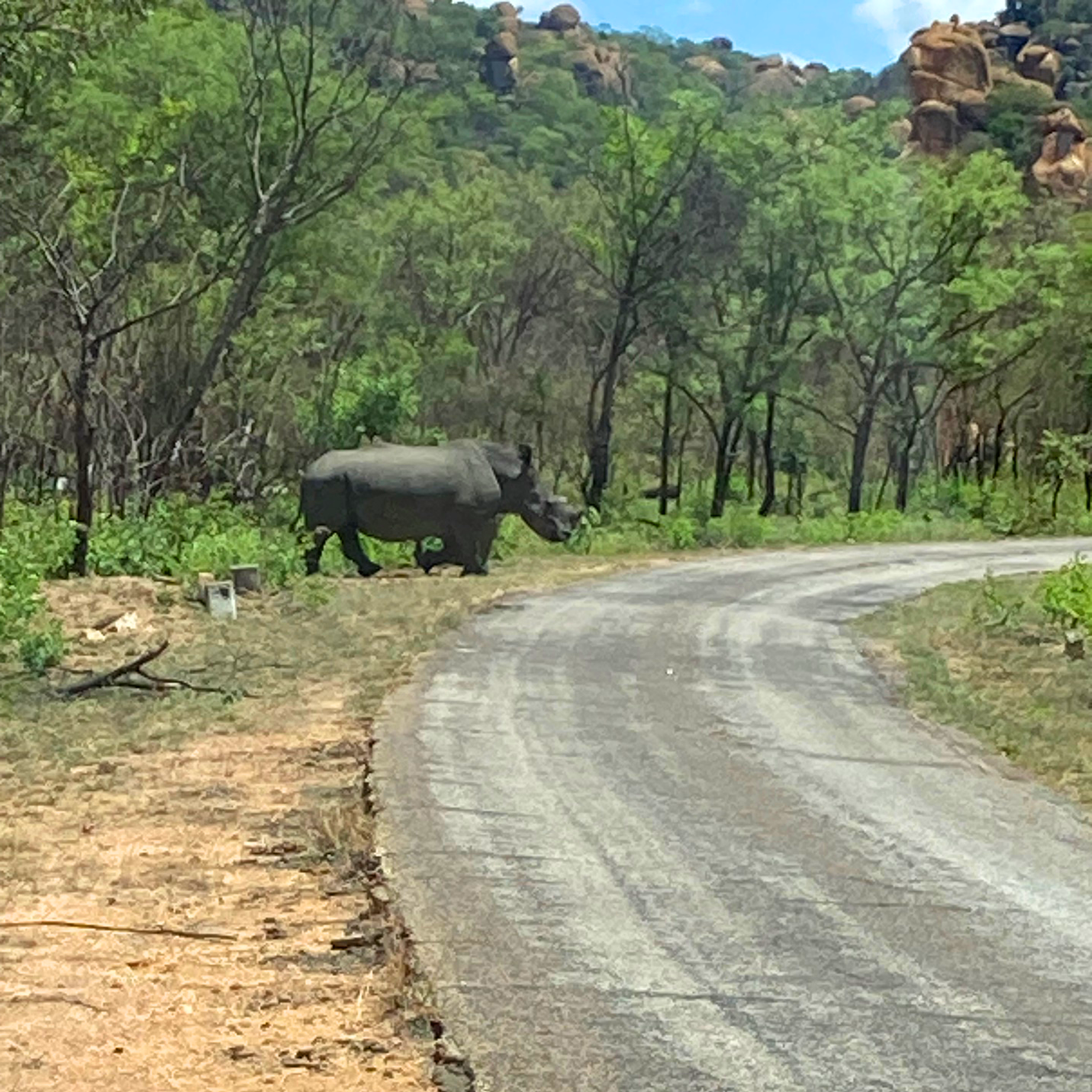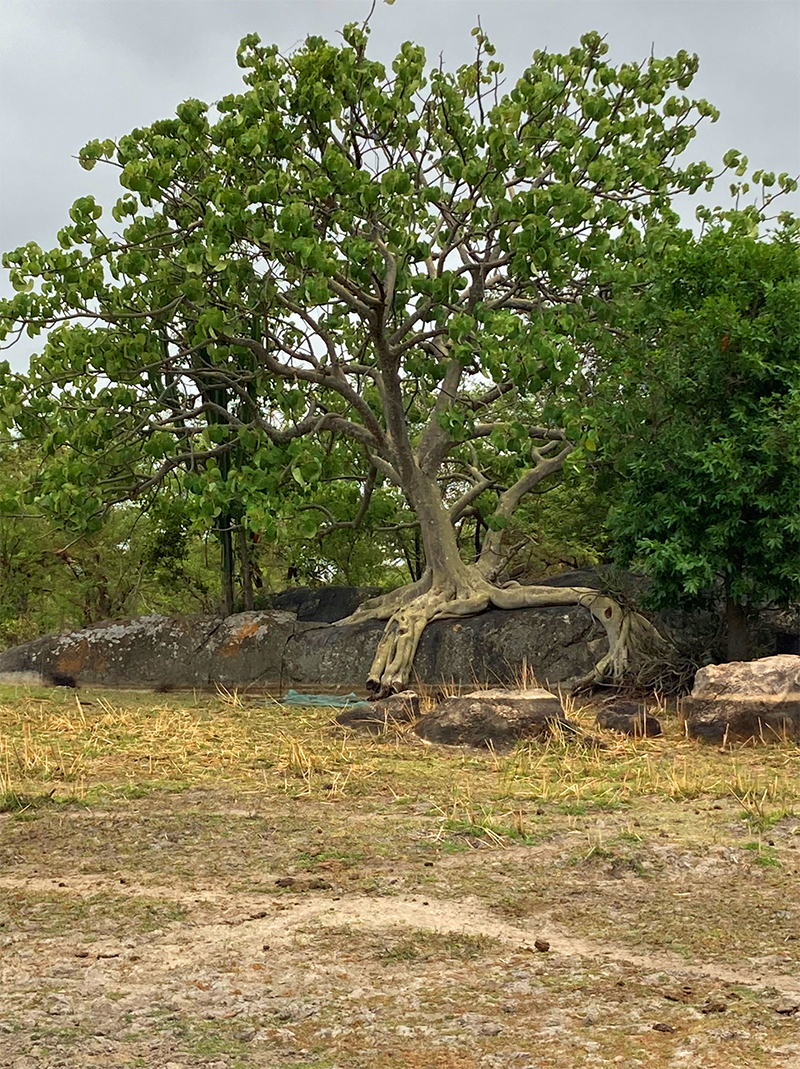
Building research partnerships in Zimbabwe

"Don't expect to see animals on our trip into town," the driver told me as we sped along the narrow road between the airport in Victoria Falls, Zimbabwe and Elephant Hills Resort where I would meet two Mennonite Central Committee (MCC) Canada workers.
I had just arrived in Zimbabwe for the launch of the LINCZ project, where CMU is a research partner supporting MCC and developing relationships through research with MCC Zimbabwe partner organizations: Kulima Mbobumi Training Centre, Brethren in Christ - Compassionate Development Services and Score Against Poverty, and Zimbabwean institutions: including the National University for Science and Technology and the Global Biodiversity Information Facility at Bindura University of Science Education.
As we drove, I kept my jet-lagged eyes peeled on the unique landscape of trees which the road bisected. As we got to town, I was rewarded by seeing several troops of baboons grooming themselves contentedly in the tree's shade. On day two, driving toward the Zambian side of the spectacular falls, I spotted an eye-catching zebra. Animals were indeed visible from the roadway. Did the driver think that I expected to see one of the Big Five on the road or was I being asked to change my expectations?
Expectations are indeed a key variable in developing respectful research partnerships. Having expectations allows us to anticipate and presume. And just a few months into this new research partnership, I had learned to anticipate quick deadlines and new opportunities.
My participation in the inception workshops in Zimbabwe was decided the month before, and the airline tickets purchased only five days prior to departure. MCC sponsored this first trip for me and my colleague, Dr. Rachel Krause, a member of the LINCZ CMU research team. During the trip, we were to cultivate CMU's nascent partnership and gain greater insight into the project and CMU's responsibilities.
I went into the trip with broad expectations—develop relationships with MCC's Zimbabwean partners, connect with staff from MCC Zimbabwe, and learn more about the LINCZ project and how it might function over the next few years. My expectations were soon exceeded as I visited some of Zimbabwe's natural marvels and listened and learned from and with Zimbabwean partners.
Zimbabwean marvels
Trees. I loved the wide variety of trees that I observed. I visited an historic Baobab tree over 1000 years old, dubbed the "Big Tree" near Victoria Falls. And this Ficus tree was seemingly growing out of a rock. I admired its singularity and ability to survive.

Rhinos. I saw lots of slowly moving, powerful and protective rhinoceroses in the wild and heard about ways that Zimbabwean civil society and the government are trying to preserve these gentle giants.
Indigenous knowledge systems are well-developed, cultural ways of knowing. Being in Zimbabwe I learned briefly about a system of identification, beliefs and spiritual meaning related with totems. Fathers hand down their animal totem to their children and people marry across totems. Being of a certain totem (zebra, lion, mouse, etc.) requires families not to consume or harm that animal, leading to the conservation of biodiversity. As a visitor to Zimbabwe, I was intrigued by my preliminary exposure to totems as a relevant, contemporary cultural mechanism for preserving biodiversity.
Listening required
As Agree Dube, MCC Zimbabwe's program manager, expertly navigated the potholed highway between Victoria Falls and Bulawayo, we talked about CMU's proposed role in the project, leading the LINCZ Learning and Research Hub. Agree asked about what CMU could offer to the project while emphasizing the need for Zimbabwean organizations and communities to benefit from the research.
This conversation helped me to think not only about what CMU was delivering but also about how we were doing research, how we could become more attentive to the communities involved in the research, and how we could give back to these communities. I was invited to become more open to what CMU could offer and not simply stay within the confines of already designed research deliverables. I was reminded about relationships and reciprocity—Indigenous research values that I had learned about in Shawn Wilson's (2008) book, Research is Ceremony: Indigenous Research Methods. Developing relationships, finding places to honor gifts, and listening consistently are keys to building a respectful partnership.
Agree's comments invited me to reflect on the vital role that listening plays in relationships. And listening requires me to do something that I am not always good at—shifting expectations. CMU may need to change the ways that we do research to respond to the needs of project partners. Listening and being open to the desires that emerge from conversations can lead us in healthier directions and to develop stronger alliances.
I had the opportunity to listen throughout the four-day inception workshop. Engaging with people in meetings and relating over meals, I met Dr. Kuda Chirambwi, Professor of the Peace, Leadership and Conflict Transformation Programme at the National University of Science and Technology. We talked about qualitative research philosophies and practices, and on the last day of the workshop, I experienced his energetic and participatory facilitation style. On the morning of our departure from Bulawayo, Dr. Kuda nurtured the relationship with CMU by coming for another visit where we conversed in the lodge's gazebo and planned ways to build relationships among our respective research teams.
Trying new things
During one of our last days at the lodge, a Zimbabwean colleague tried a Coke float for the first time. While ice cream sodas are commonplace in North America, they are less familiar in Zimbabwe. Words of encouragement emanated from those of us from North America. We said things like, "Coke floats are so good, refreshing in the heat, a tasty mix of two good things." It was clear we wanted our colleague to try this North American concoction. And he finally did try it. I couldn't tell from his facial expression if he really liked it, but he kept on trying it.
One of my takeaways from this experience is a reminder that what we do is based on what we know or is familiar to us—our culture. When we travel far from home, like we are doing in LINCZ, we need to become aware of our culture and our expectations of how we conduct research. We need to listen to our partners as they communicate with us, and we may need to try new things. This research partnership must also consider reciprocity and the needs of those with whom we are working. In this partnership with MCC in Canada and Zimbabwe and with Zimbabwean organizations, we will seek to heed the call to listen, shift our expectations and try new things.